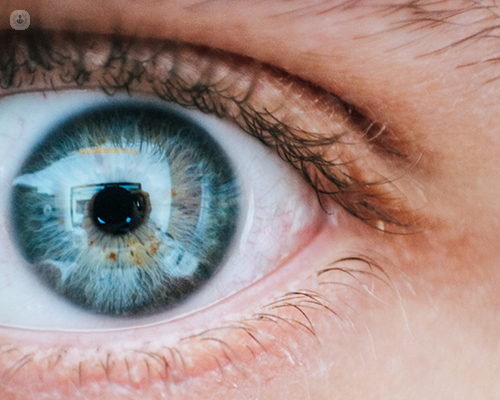What is thyroid eye disease?
Escrito por:Thyroid eye disease (TED) also known as Graves’ Orbitopathy, is an autoimmune inflammatory disorder causing swelling of the tissues around the eyes and within the eye socket.
Because the socket is like a bony box, this increase in the volume of the contents can cause the eyes to bulge forwards, producing a staring appearance, and the muscles that are attached to the eyes can move irregularly causing double vision. In the most severe cases it can cause the cornea (clear surface of the eye) to break down or press on the optic nerve causing loss of vision. Leading consultant ophthalmic and oculoplastic surgeon, Miss Vickie Lee talks through the disease, and how it can be treated.

What causes thyroid eye disease?
The cause of thyroid eye disease is due to autoimmune antibodies that affect both the thyroid and the structures of the eye socket.
The condition is usually caused by Graves’ disease, a condition that causes over-activity of the thyroid gland, located in the neck area, which normally controls the metabolism of the body. However, the condition can occasionally be associated with an underactive thyroid. Patients with these conditions have a 1 in 5 risk of developing eye disease.
In 3 out of 4 patients, the eye disease starts in the same year as the over (or under) active thyroid and can come on suddenly or more slowly. Smoking can increase the risk of developing eye disease, and can lead to having a poorer response to treatment.
What are the symptoms of thyroid eye disease?
All patients with an overactive thyroid related to Graves’ disease should be alert to the symptoms of eye disease.
Early warning signs may include:
- redness in the eyes or eyelids
- swelling or feeling of fullness in one or both upper eyelids
- bags under the eyes
- eyes that seem to be too wide open
- pain in or behind the eyes
- gritty eyes with sensitivity to light
- blurred vision
- double vision
If a patient experiences one or several of the following symptoms they should seek referral to an oculoplastic surgeon (eye doctor with a specialist interest in thyroid eye disease).
Can thyroid eye disease be treated?
Management of thyroid eye disease focuses on controlling the risks (normalising the thyroid hormone levels and stopping smoking) and assessing the severity of the eye disease.
Ideally this condition should be managed with thyroid specialists and eye doctors working closely together to decide on the best management. Miss Vickie Lee works closely with a number of thyroid specialists to formulate the best treatment for each individual patient.
The first stage focuses on calming the inflammation. This is likely to include lubricating eye drops to avoid drying damage to the eye. There is some evidence selenium supplements are helpful in mild disease.
In more severe cases, Miss Lee may start treatment with intravenous steroids which are usually very effective in controlling the swelling, pain, and double vision. However, usually steroids do not reverse the disfigurement caused by the disease. If there is decreased vision due to the break-down of the surface of the eye, or compression of the optic nerve, this is an emergency that requires immediate medical and sometimes surgical treatment.
After the active stage of the disease is over (which may last a year, or longer in smokers) the patient may be left with double vision, bulging or staring eyes. Miss Lee and her colleagues can plan different stages of rehabilitative surgery but it may take some time for all the treatment to be completed.
If you are concerned about thyroid eye disease, make an appointment to see a specialist here.


